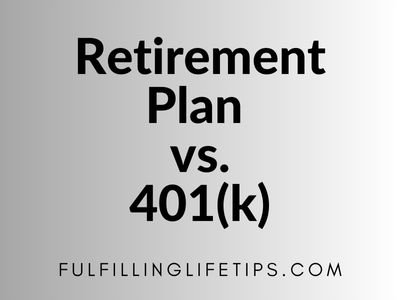Retirement planning advice is a critical aspect of financial management that should not be taken lightly. As you approach retirement age, you want to ensure that you have enough savings and investments to support yourself throughout your retirement years.
Also choosing between Retirement plan vs 401(k) can be complicated but we are here to provide you with enough information to help you make your decision.
Retirement planning advice tips
Here are 10 essential retirement planning advice tips to help you achieve a secure future.
- Start early: The earlier you begin saving for retirement, the more time your investments have to grow. Starting early allows you to take advantage of compound interest, which can significantly increase your savings over time.
- Determine your retirement goals: It is essential to determine what your retirement goals are and how much money you will need to achieve them. This will help you to establish a realistic retirement plan that is tailored to your specific needs.
- Estimate your retirement expenses: Understanding your future expenses is critical when it comes to retirement planning. Take into account expenses such as housing, healthcare, transportation, and leisure activities.
- Create a retirement budget: Once you have determined your retirement expenses, create a budget that outlines your projected income and expenses. This will help you to manage your finances and ensure that you are not overspending.
- Consider working longer: Delaying your retirement and continuing to work can help you to increase your savings and retirement benefits. It can also allow you to delay taking Social Security benefits, which can increase your monthly benefits.
- Maximize your retirement contributions: Take advantage of retirement plans such as 401(k)s and IRAs and maximize your contributions. These plans offer tax advantages and can significantly boost your retirement savings.
- Manage your debt: Manage your debt effectively and pay off high-interest debt such as credit cards and personal loans as soon as possible. This will free up more of your income for retirement savings.
- Diversify your investments: Diversifying your investments can help to reduce risk and increase your returns. Consider investing in a mix of stocks, bonds, and mutual funds.
- Plan for unexpected expenses: Unexpected expenses can derail your retirement plan, so it is important to plan for them. Build an emergency fund that can cover unexpected expenses such as medical bills or home repairs.
- Consult with a financial advisor: If you are unsure about your retirement plan, consult with a financial advisor who can help you to create a personalized retirement plan that meets your needs.

Retirement plan vs 401(k) which is better?
A retirement plan is a financial plan that is designed to help individuals save and invest money to support themselves in retirement. There are several different types of retirement plans, including 401(k)s, IRAs, and pension plans.
A 401(k) is a specific type of retirement plan that is offered by employers to their employees. Employees can contribute a portion of their salary to their 401(k) account, and their employer may also contribute to the account on their behalf. The money in a 401(k) is invested in stocks, bonds, mutual funds, or other investment vehicles, and grows tax-free until it is withdrawn.
One of the main advantages of a 401(k) is that it allows employees to save money for retirement on a tax-deferred basis. This means that the money they contribute to their 401(k) is deducted from their taxable income, which can reduce their overall tax bill. Additionally, many employers offer matching contributions, which can significantly boost an employee’s retirement savings.
However, there are also some potential drawbacks to 401(k)s. One is that they often have limited investment options, which can make it challenging to create a well-diversified investment portfolio. Additionally, 401(k) plans often charge fees, which can eat into an employee’s investment returns over time. Finally, there are restrictions on when and how the money in a 401(k) can be withdrawn, which can limit an individual’s flexibility in retirement.
In comparison, a broader retirement plan is not tied to a specific employer and may offer more flexibility and investment options. An individual retirement plan (IRA), for example, is a type of retirement plan that is available to anyone with earned income. IRAs offer many of the same tax benefits as 401(k)s, but they typically offer a wider range of investment options and lower fees. Pension plans are another type of retirement plan, often offered by larger employers or government agencies, that provide guaranteed income for life.
Overall, both retirement plans and 401(k)s can be valuable tools for saving for retirement, but it is important to understand the differences between them and choose the one that best fits your individual needs and goals.
Conclusion to Retirement planning advice
Retirement planning advice is a very critical topic today and it requires careful consideration and planning. By following these 10 essential retirement planning advice tips, you can increase your chances of achieving a secure future and enjoying your retirement years to the fullest.




